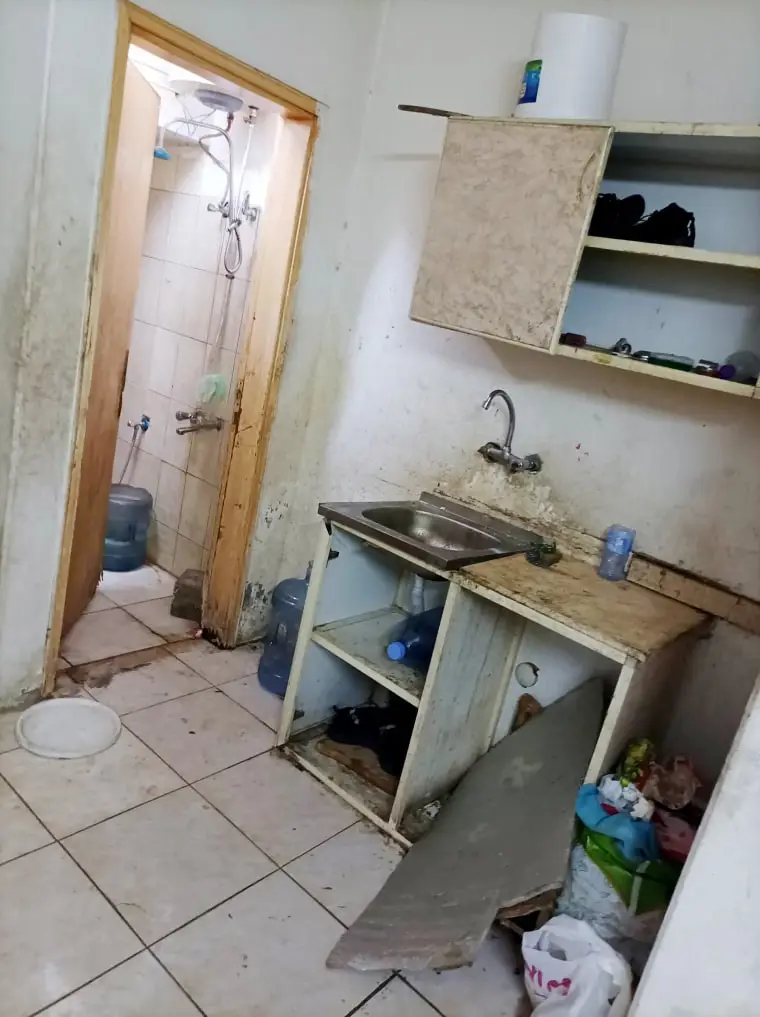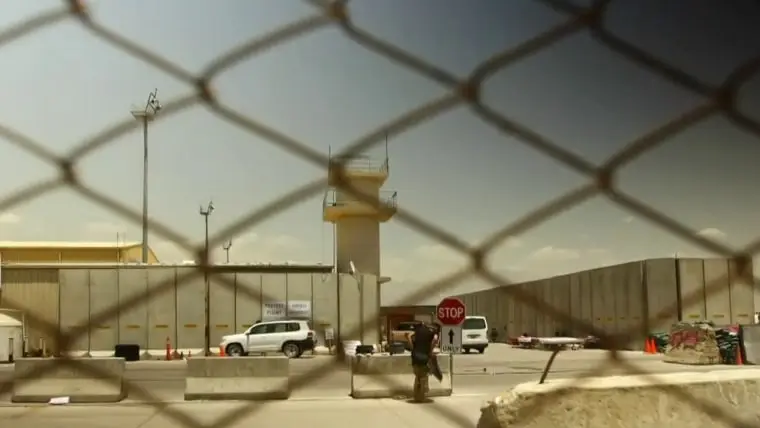
'Kill us or send us home': Amazon workers in Saudi Arabia say they were exploited by labor supply and recruiting firms
This story was reported in collaboration with the International Consortium of Investigative Journalists, Arab Reporters for Investigative Journalism and The Guardian.
Momtaj Mansur flew to Saudi Arabia in September 2021, excited to work at one of the world’s biggest companies, Amazon. He was promised a well-paying job and planned to use the money to help his family back in Nepal.
Less than a year later, he said he was living in a crowded room with seven other men, jammed with bunk beds infested with bed bugs. The water was often salty and undrinkable. His hopes were shattered, and he was deep in debt.
Momtaj Mansur is one of more than 50 current and former workers who said they were misled and exploited by firms that supply labor to Amazon in Saudi Arabia and by their network of recruiting agencies in Nepal.
All the workers said they had to pay fees to recruiters to get hired, ranging from the equivalent of $830 to $2,040, even though fees that large are illegal, according to the Nepali government. To pay those fees, many workers needed to take out loans at high interest rates. They also all said they were duped by recruiters into working for labor supply companies rather than directly for Amazon.
The workers were interviewed as part of an international reporting collaboration with NBC News, the International Consortium of Investigative Journalism, Arab Reporters for Investigative Journalism and The Guardian.
Click here to read the ICIJ's version of this story.
About a dozen workers like Mansur agreed to speak on the record. Others, fearful that speaking out would hurt their chances for other employment, were interviewed with the agreement that their names would not be published. To substantiate their accounts, the journalists reviewed photographs, emails, receipts, messages and other documentation from their time working at Amazon.
After being presented with the findings, Amazon told NBC News it had conducted its own investigation and found labor violations. The company promised measures to fix the problems, including compensating workers who paid recruiting fees to the companies supplying labor.
“We are deeply concerned that some of our contract workers in the Kingdom of Saudi Arabia … were not treated with the standards we set forth, and the dignity and respect they deserve,” John Felton, Amazon’s senior vice president of worldwide operations, said in a written statement.
“We appreciate their willingness to come forward and report their experience,” Felton wrote. “Our supply chain audit process and our own investigation surfaced violations of our standards.”
In particular, the company cited recruiting fees and squalid housing among the violations it found, but declined to offer more details or discuss other labor violations.

A key player for Amazon is a labor supply company that gets workers from other countries — the Saudi-based Abdullah Fahad Al-Mutairi Co. Amazon is among several large corporations that has contracted Al-Mutairi, which has billed itself as “a leading provider of human resource solutions in the Kingdom of Saudi Arabia.” Forty-nine of the 54 workers interviewed were hired through Al-Mutairi.
Amazon said it considered “suspending” the company “when these allegations came to light.” Instead, it decided to work with Al-Mutairi to make “significant changes to their operations.”
Al-Mutairi did not respond to repeated requests for comment.
To get workers, Al-Mutairi has worked with recruiting companies in Nepal and elsewhere to attract laborers.
Momtaj Mansur in Nepal was one of them.
When he came to Saudi Arabia, he worked at Amazon’s vast two-story warehouse called RUH 6, in the capital city, Riyadh. He spent his nights as a “picker,” hustling up and down aisles grabbing iPhones, packs of Red Bull and other items ordered by Amazon’s customers across the Arabian Peninsula. He recalled that Amazon managers berated him for being slow, even as he exceeded company targets to pick 70 to 80 items an hour from shelves and boxes.
Then things got worse. In May 2022, Mansur said, he was among a group of workers who were let go without warning or explanation — without work, wages or enough food.
Mansur said he pleaded with Al-Mutairi: If there was no more work at Amazon, let them return to Nepal.
“I told them: Either kill us or send us home, but don’t give us so much pain.”
He said the labor supply firm told him that the only way he could return home was to pay the company an exit fee of more than $1,300 as a penalty for leaving before the end of his two-year contract. It was an enormous sum for his family, which subsisted on about $300 a month, along with rice, wheat and peas grown on a fifth of an acre shared with relatives.
The labor firm was “heartless,” Mansur said. “How could I pay that amount? By selling our house or my kidney?”
In the end, his family sunk itself even deeper in debt by taking out a loan — at 36% interest — to pay the exit fee.

Twenty workers interviewed for this story said labor supply firms told workers they could not go home to Nepal unless they paid exit fees that often equaled several months’ wages.
Mansur is back home in Nepal, cultivating crops on his family’s small plot of land. But he’s still angry at the firms he blames for his agony in the Arabian Peninsula. He asks himself: “What sin did I commit to end up in Saudi?”
Amazon told NBC News that Mansur had a good work record, and would be welcome to return to employment with the company.
The interviews with workers describe practices that are considered by experts to be markers for potential labor trafficking under U.S. law and U.N. standards. These include subjecting workers to abusive working and living conditions; restricting their movement; and making false statements about the identity of the employer. U.N. standards say any recruitment fees should be paid by the employer, not the worker.
Several workers said they complained to Amazon warehouse managers or human resources officials about low or missing wages, poor housing conditions and the strains of warehouse work.
Amazon said it is working to improve oversight of its labor suppliers and prevent future violations of its standards.
“We’re implementing stronger controls for all our vendors to ensure similar incidents do not occur and to raise overall standards for workers in the region, including providing enhanced trainings for our third-party vendors on labor rights standards with a specific focus on recruitment, wages and deception,” said Felton in his written statement to NBC News.
“Amazon does not tolerate violations of our long-established supply chain standards or global human rights principles, and we take any allegation of violation extremely seriously,” Felton stated.
Read the full Amazon response here.
Labor trafficking found on U.S. military bases
Oct. 27, 202203:49Amazon in the Middle East
Amazon entered the Saudi Arabian market in 2017, when it purchased the Middle Eastern online retail giant Souq.com, which had started in Dubai, in the United Arab Emirates. It rebranded Souq under the Amazon name and boosted its labor force by bringing in workers from Pakistan, India, Bangladesh and Nepal. In 2023, Amazon reported employing nearly 1,500 permanent and seasonal workers in Saudi Arabia.
As one of Asia’s poorest countries, Nepal has long been a major source of foreign workers employed overseas by companies large and small. These workers send money to families back home. The World Bank reported that in 2022, overseas remittances back home accounted for 23 percent of Nepal’s gross domestic product.
Many Nepali workers have heard horror stories from family and friends facing bad working and living conditions overseas.
In a survey published in 2017 in the prestigious British medical journal BMJ, most Nepali men who have worked outside the country indicated that they had “experienced exploitation at all stages of the migration process.” Half reported being targets of deceptive recruiting practices.
Like many Nepali workers, Mansur knew it is better to seek direct employment rather than working for a labor supply company.
When an agent with Rove International, a recruiting firm based in Kathmandu, offered him work at Amazon, Mansur did research. He decided a big American corporation like Amazon might differ from other companies that had abused fellow Nepali workers.
Knowing that “agents tell lies,” he said, he asked repeatedly whether he would be an employee of Amazon or a labor supply company. The agent “confirmed to me that it was direct employment from Amazon,” Mansur said, “and it would change my life.”
He was surprised, he said, when Rove International told him that he must pay a recruiting fee of over $2,300 — especially since he knew Nepal’s government caps the fees that employment firms can charge workers heading to Saudi Arabia at less than $85. Six other Nepalis confirm that Rove International charged them recruiting fees of more than $1,000 each.

Like other Nepali workers, Mansur said he paid the fee. He saw it as the cost for an opportunity to work for Amazon.
Nepali workers heading to Saudi Arabia are especially vulnerable because Nepal’s government has failed to enforce its policies forbidding recruiting agencies from charging high fees, according to Nepal’s parliament, its Supreme Court and the U.S. State Department.
Workers seeking jobs in the Middle East are also at risk because of the kafala system — a matrix of labor and immigration laws in some Gulf states that gives employers control over migrant workers’ employment and immigration status. In Saudi Arabia and other countries where forms of the kafala system still exist, many foreign workers are fearful they can be punished if they leave an employer.
Arriving in the Kingdom
In September 2021, Mansur traveled from his home in southern Nepal to Kathmandu and got on a Jazeera Airways flight — the first time he’d ever flown and his first time outside Nepal.
When he arrived in Riyadh, Mansur and other new workers from Nepal were met by Amazon officials — or so Mansur thought.
A few days into his job at an Amazon warehouse, Mansur noticed that his green ID badge differed from the blue badges worn by many other workers. The workers with blue badges were employed directly by Amazon, a co-worker explained. Those wearing green badges weren’t direct Amazon employees — they were temporary workers from a labor supply provider.
He learned he was working for Al-Mutairi, not directly for Amazon.
Records show Nepal’s Department of Foreign Employment issued work permits in September 2021 to Mansur and 36 other Nepalis whose labor contracts were being channeled to Al-Mutairi by Rove International, the Nepali recruiting firm.
Heera Lal Shah, managing director of Rove International, said the company “followed all legal procedures set by the government, and these workers knew where and how they were going to work.” He did not respond further to questions detailing worker allegations.
Forty-eight of the 54 Nepali workers interviewed for this story said recruiters misled them about the terms of their employment, falsely promising they would work directly for Amazon.
During their time in Saudi Arabia, the workers said, they were paid less than those who work directly for Amazon.
“We worked more and harder, but the salary we received was much less,” Mansur said.
‘Workers are afraid’
Inside Amazon’s distribution centers, the pace is fierce. Pickers roam the floors, grabbing items and handing them off to packers, who stand for hours at a time. Workers said managers watch pickers through closed-circuit cameras and monitor their movements. Nepali workers report that Amazon supervisors stalked them up and down the aisles of the warehouse, yelling, “Yalla! Yalla!” — Arabic for “hurry.”
During a normal shift, Mansur covered as many as 9 miles across warehouse floors. “I would feel extremely weak. My legs would hurt,” he said. “When I returned home, I would feel like I was being pierced with needles or walking barefoot on stones. My whole body would ache.”
More than 20 workers were interviewed this summer while they were still employed at Amazon warehouses in Saudi Arabia. They agreed to talk only if their names were not published because they feared retaliation for speaking out. They echoed many of the concerns that Mansur and former workers raised.
“Amazon makes people work like cattle,” said one current worker who said he had to pay a substantial recruiting fee and now lives in squalid housing. “Amazon is a big company. I had a dream of earning money. I wanted to do something after earning money. But it didn’t happen. What I expected didn’t come true.”
During rush periods — such as sales or holidays — supervisors monitored restroom activity, sometimes admonishing them, workers said, for taking too much time away from the warehouse floor.
“They wanted us not to take breaks when there was a high work demand,” said Surendra Kumar Lama, who worked at an Amazon warehouse in Saudi Arabia from 2021 until the end of 2022, and who Amazon said was, like Mansur, a good employee who would be welcome to return to the company. “They would stand near restrooms and water stations because workers are afraid of them. Many times, I waited half an hour or an hour to go to the restroom because they were there.”

‘I lost many things’
After a long day at Amazon’s warehouses, workers come home to living accommodations provided by Al-Mutairi. Many said the housing units are cramped and squalid, with cockroaches scuttling across the floor and a briny water supply that caused rashes. Often, workers said, sleeping mattresses were infested with bed bugs and at times air conditioners — much needed for living in the hot desert country — were not functioning.
“How can eight people stay together in a small room?” Mansur said. “There was no space to put personal belongings. We would keep those on our beds.”
In some cases, workers successfully lobbied Amazon officials to prod Al-Mutairi to address the housing problems, but improvements often did not last, according to workers. When they reported the water issue to Amazon, said one former worker, “Al-Mutairi threatened us: ‘Who complained about this? We will make him jobless!’” Other workers reported similar threats.
Al-Mutairi was strict about requests for time off for family emergencies back home in Nepal, according to 23 current and former workers.
The labor supply firm, they said, will give a worker two choices: He can pay a large fine upfront. Or he can persuade co-workers to sign a “guarantor” contract agreeing that they will pay a fine on his behalf if he doesn’t return to Saudi Arabia to complete his labor contract.
One former worker said he missed the birth of his son and his father’s funeral because Al-Mutairi wouldn’t let him go home. Even after he showed the firm his father’s death certificate, he said, the company said he could go only if he paid a penalty of $1,600 — more than four months’ salary. He couldn’t afford it, and he couldn’t find a co-worker willing to sign as his guarantor, he said.
“I couldn’t be with my dad when he died. I couldn’t hold and look at my son when he came into this world,” the former worker said. During his time in Saudi Arabia, he said, “I didn’t achieve anything, but I lost many things.”
‘The last stage’
One afternoon in May 2022, a few hours before his next shift began, a message popped up on Mansur’s mobile phone: “Don’t go to duty,” it said, and listed dozens of names as “people stopped from Amazon.” He found his own name on the list. He’d been laid off.
The laborers from Nepal had come to the Arabian Peninsula expecting they would be working difficult but steady jobs. Instead, they found that job security is almost nonexistent.
“Every day, we fear that we could be terminated the next day. We work every day as the last day of our work,” said a Nepali still working in an Amazon warehouse in Riyadh.
Once laid off, workers said, a new ordeal begins. They lose housing reserved for those working at Amazon, they said, and are shunted to worse housing set aside for those without jobs. They get no wages or money for food. Many languish for weeks or months waiting for Al-Mutairi to place them back with Amazon or some other business.
During Mansur’s stay, he survived by eating kuboos — Arab flatbread — once a day and borrowing money from former co-workers. Some days, he said, he didn’t eat at all. When his friends could no longer support him and Al-Mutairi did not find him another job, he decided to pay the exit penalty and go back to Nepal. “It was better going home than dying of hunger,” he said.
Other jobless workers have slipped away from the accommodations and worked illegally in construction and restaurants without proper work papers, despite the risk that they could be detained.
Loneliness, hunger and stress pushed some jobless workers toward dark turns of thought.
Manish Kumar Sodari, an Amazon worker who said he was laid off for making too many errors gathering items in the warehouse, said he spent days caring for another laid-off worker who was talking about hanging himself.
Soon, Sodari said, he began having suicidal thoughts himself.
“How can one stay helpless for three to four months?” he told a reporter in January. “I have already suffered a lot. I am at the last stage.” He said he returned home to Nepal several months later, and is now working in India.
Saudi Arabia announced reforms of its labor regulations in 2021 that authorities claim make it easier for workers to change jobs and leave the country. But human rights advocates said migrant workers in the region remain vulnerable because these limited protections have yet to be widely implemented or enforced.
“Migrant workers are still facing severe abuses despite these highly touted reforms,” said Michael Page, a Human Rights Watch official. “Workers are still unable to change jobs easily without the permission of their old employer.”
Mansur feels guilty about the unpaid loans that he and his family took to get him to the Arabian Peninsula, and to bring him back to Nepal. Interest charges are piling up. He fears the village moneylenders will seize the family’s land.
“I lost time and money working at Amazon. I lost everything,” he said. “I lost my body and my strength. ... My family’s financial situation is devastated now.”
But like many migrant workers around the globe, Mansur isn’t going to let that harrowing experience stop him from trying to find an employer that pays a fair wage and treats him decently. He’s begun to look again for an overseas job. He’s open to working most anywhere — except Saudi Arabia.







